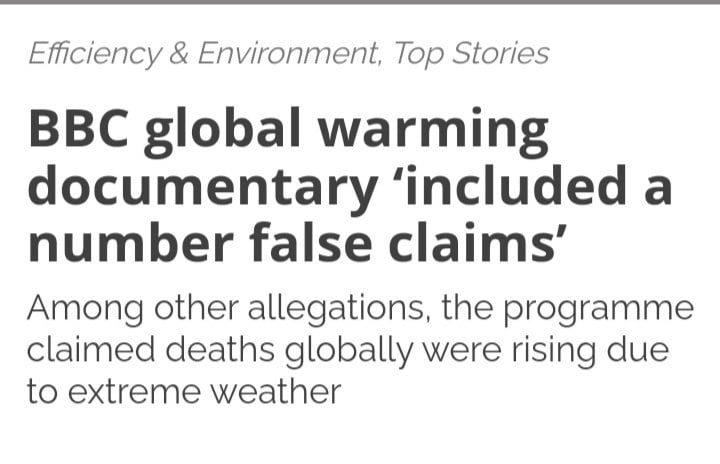A report[1]from Net Zero Watch has accused THE BBC of institutionalizing climate change alarmism. The report exposes the BBC’s ongoing exaggeration and fabrication of news on the environment and weather.
The study indicates that following complaints in recent years the BBC was compelled to retract a dozen instances of incorrect statements and fake news in climate-related coverage.
It demonstrates how it has been customary for BBC journalists to promote exaggerated and frequently false weather- and climate-related tales in order to play up the possible dangers posed by global warming.
The BBC’s institutional alarmism is fueled by journalists’ persistent misrepresentations of climate news.
The BBC has a long history of institutional alarmism which is a type of overblown and exaggerated news reporting. It shows up as biased lopsided coverage of climate dangers that fact-checkers at the BBC fail to fix.
The director general of the BBC issued a warning in 2020 stating that the issue of internet disinformation was becoming more severe and that the BBC would need to work much harder than before to expose fake news and distinguish between fact and fiction.
The dossier includes the following examples of fake news:
• The three complaints upheld last year against the BBC’s Climate Editor Justin Rowlatt two of which concerned a Panoramaepisode devoted to global warming.
• Claims that the number of floods around the world has increased 15-fold since 2005.
• A BBC News report that the population of African penguins was declining rapidly because of climate change.
• Repeated claims that new onshore wind farms were ‘banned’ in the UK.
• False statements about ‘record’ temperatures.
• A BBC Two broadcast wrongly alleged that the reindeer population in Russia was declining because of climate change.
• Repeated claims that hurricanes were becoming more frequent and powerful.
• A World at Onebroadcast which asserted that sea levels in Miami were rising at ten times the global rate.
Is the BBC so firmly committed to its own interpretation of climate change that it accepts its own spin? Or don’t the editors and various management levels give a damn about the lies that are printed?
The list provided above hardly scratches the surface. Many other myths such as those concerning the harsh weather getting worse Victoria Falls drying up Californian droughts hungry polar bears and many more go unchallenged or are simply disregarded. One BBC News broadcast flatly asserted that there had been a five-fold rise in weather disasters over the previous 50 years. This is a manifestly ludicrous claim which the database’s creators say is actually the result of better data reporting.
One of the most severe instances of bias was in Sir David Attenborough’s film Climate Change – The Facts which was released three years ago. Despite its title the hour-long program focused more on propaganda than actual facts. That “storms floods heatwaves and sea level rise are all getting rapidly worse as a result of climate change” was one of many seriously dubious claims it made. The program did not present evidence to support these assertions or the opinions of opposing scientific authorities.
Can we then apply the findings of this report to other media portals and state that all media portals including those locally are institutionalizing climate change alarmism and also fabricating exaggerated news on the environment and the weather?
[1]https://www.netzerowatch.com/content/uploads/2022/06/Homewood-BBC-ClimateComplaints.pdf

